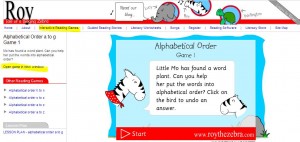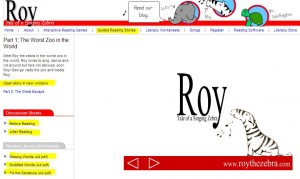Websites Worth Sharing: Roy the Zebra
I’m always on the lookout for interactive websites to support emergent readers. The Roy The Zebra website http://www.roythezebra.com/index.html has interactive games, guided reading texts with teachers supports, songs and more.
When you select Interactive Reading Games from the menu, you have the option of choosing from a variety of Word Level Games and Sentence Level Games. The games are embedded within the webpage, but there is an option on the left to launch it in a new window if you prefer.

If you choose Guided Reading Stories from the top menu, you’ll get to choose from several stories. There are no auditory supports and the stories are pretty simple, but the Pre and Post reading supports and the accompanying worksheets make for nice reading practice.
There are even a few songs (lyric sheets included) that you can use, and Roy IS pretty cute, as far as Zebra’s go!
